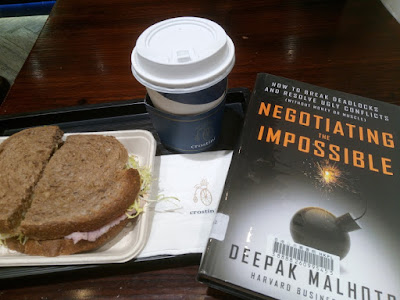哈佛教授的書, 已代表了不會差. 以前哈佛有一本「哈佛談判術」我覺得差不多是後無來者了. 此書有些新意, 但也還及不上它.
和其他的遊說書不同是很多世界歷史大事的分析, 不是簡單的商店討價還價策略.
談判時要增加自己的價值, 開拓更多的條件去談判,
球隊與班主就分賬的談判.
NHL (National Hockey League) 2011
Owner vs players: 6:4 vs 5:5
本來把收入由六四改為五五分賬.
最後是轉用了不同的方法去分賬.
55% League Media Revenue (revenue from TV rights)
45% NFL Ventures /Postseason revenue (revenues from related business of the NFL)
40% of local revenue (Stadium revenue)
以古巴飛彈危機去解釋「empahy」在談判時的重要.
1962 Cuban Missile Crisis
Consider the Soviet perspective:
1. US already had nuclear-capable missiles stationed close to the Soviet Union, in Turkey and Italy.
2. There was a significant "missile gap" at the time, with US nuclear capabilities (ie no. of missiles, bombers, and warheads) being an order of magnitude greater than those of the Soviet Union.
3. the Soviet arsenal was a scarcity of intercontinental ballistic missiles capable of reaching the US in the event of war.
4. CIA kept hatching plans to assassinate or overthrow Fidel Castro, something the SU and Cuba found more than a little irksome. (disgusting)
The SU would remove the missile sites under UN monitoring - which they did the following month. In exchange, the US would end the quarantine and make two promises "
1. Would deliver "no-invasion" pledge regarding Cuba.
2. US should dismantle the missiles based in Turkey and Italy that the SU considered threatening. But there was a twist, the Americans demanded the removal of US missiles be a secret element of the deal; but he would not be able to declare victory.
... Only decades later would the United States acknowledge publicly that JFK had, in fact, mad a quid pro quo (以物易物) offer to remove US missiles in exchange for the removal of Soviet missiles.
是一本好看的書.

沒有留言:
張貼留言